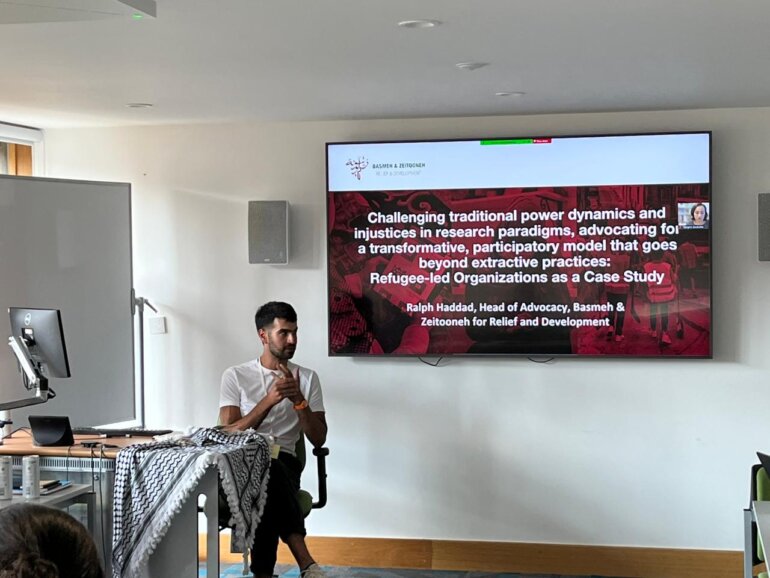Social justice in many forms at DSA2024
As the dust settles on DSA2024, those attending don’t simply disappear for a year, but are working earnestly on how to advance the connections made and ideas formed during the conference. We spoke to some delegates at the conference and below we also share additional post-conference reflections and observations from: Claude Samaa, Hamid Khalafallah, Kristen Hope, Emanuela Girei, Alice Mpofu Coles, Kole Odutola, Chelsea Klassen, Muthanna Saari and Lawrence Ado-Kofie.
If you didn’t attend the conference you can still reach out and connect with those working in similar areas. If you’d like to share your conference experience please get in touch with Rowena.
From finance to sport: a rich diversity of topics
Dr Lawrence Ado-Kofie, Lecturer in Development Economics, from the University of Manchester presented on financing the healthcare coverage gap in Africa. His research estimates the financing gaps for achieving Universal Health Coverage in Africa and examines various sustainable financing schemes likely to close the UHC gap. He said the conference was “very inclusive, with lots of people from different countries. It’s a diverse platform to hear from other researchers and what they are doing, and this helps us achieve our goals, get contributions – get ideas to improve your paper. And you have the chance to contribute to others – it’s for the common good of all!”
Also on the subject of finance, Muthanna Saari joined a Roundtable on cash transfers and social justice. He proposed a different perspective of an ordinary cash transfer programme, away from a state-based intervention, asking: “What constitutes cash transfer and what kind of developmental paradigm do they offer? What are vernaculars used and the kind of moral assumptions encoded in these terminologies?” He put forward the idea of zakat (an obligatory payment Muslims are required to make as one of the Five Pillars of Islam) as a wealth redistribution mechanism among the Muslim community.
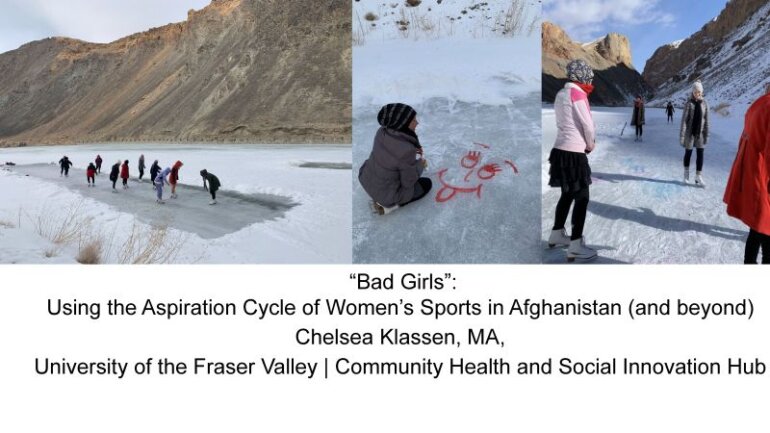
Chelsea Klassen was one of many presenting a paper on ways of tackling gender justice. She presented a paper to discuss the importance of sports in shaping and breaking gender norms (using examples from Afghanistan) and collaborate on ideas for doing this effectively in the Global South.
“The opportunity to hear about diverse methodologies from different perspectives is imperative to shaping more skilled and empathetic researchers,” she said. “I have benefited immensely from hearing about the different experiences and projects highlighted at the DSA conference this year. I was challenged by the audience to think more critically about my research, which focuses on women’s sports in Afghanistan. These critiques were most welcomed, as they only serve to sharpen me as a researcher. I’m looking forward to continuing my research and advocacy work focusing on Afghanistan in my position as lead researcher at the Community Health and Social Innovation (CHASI) hub, and my research skills developed through my work in development have been directly applicable to the local community work in the Fraser Valley. I hope one day that the women of Afghanistan can once again be safe and free to participate in sports.”
Diverse methods of presenting
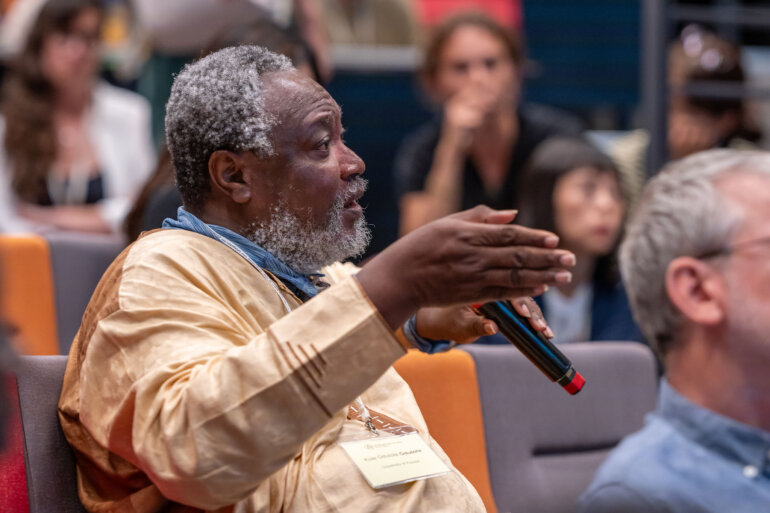
It was not just the thoughts that were diverse: participants also presented their ideas in diverse methods. Kole Odutola is a Senior Lecturer in the Department of Languages, Literatures, and Cultures at University of Florida, Gainesville. He is also a poet and captured Naomi Hossain’s keynote in poetry!
“I came to relink with scholars who work in the field that I have not had an opportunity to function in due to the nature of my employment in the last 18 years at the University of Florida,” he explained. My Masters in TV/Video for Development from Reading University left a great impact on my worldview. I really would like to pick up from where I left off in 1998!” he added. He intended his presentation on “Participatory use of video: mirage or achievable range of possibilities” to be as provocative as possible. By critically examining both successes and limitations, his research aims to contribute to a nuanced understanding of knowledges of co-production, community construction of stories as well as shedding light on whether video production represents a mirage or a tangible and achievable range of possibilities in empowering communities through visual storytelling.
Kole quipped that the DSA could also stand for: Developing Scholars Affectionately and we are delighted that he enjoyed his first DSA and the navigation of so many panels with us.
Dr Alice Mpofu Coles was another researcher who brought their experience in research and thinking to life in an innovative way – and we celebrate more of this!
In a panel themed: “Studying and doing development while black” panelists interrogated what it means to research, teach, study and implement initiatives.The workshop was a safe space to discuss experiences and strategies for navigating the development space while Black and/or centring race along themes such as: How do Black researchers and development practitioners experience the development sector or discipline?; how does a commitment to social justice within development teaching, research and practice manifest when taking race seriously?; what is the relationship between reparations, restitution, and development?; and why isn’t my professor Black?
Alice did her presentation as a spoken word performance “Is There a We in Feminism/ reflection of a PhD researcher: through lenses of anti-racism”, which she described as “a new experimental decoloniality way”. Alice is a feminist human geographer and activist, advocate for social justice, activist, author, creative researcher and a Local Councillor. Read part of her spoken word performance below.
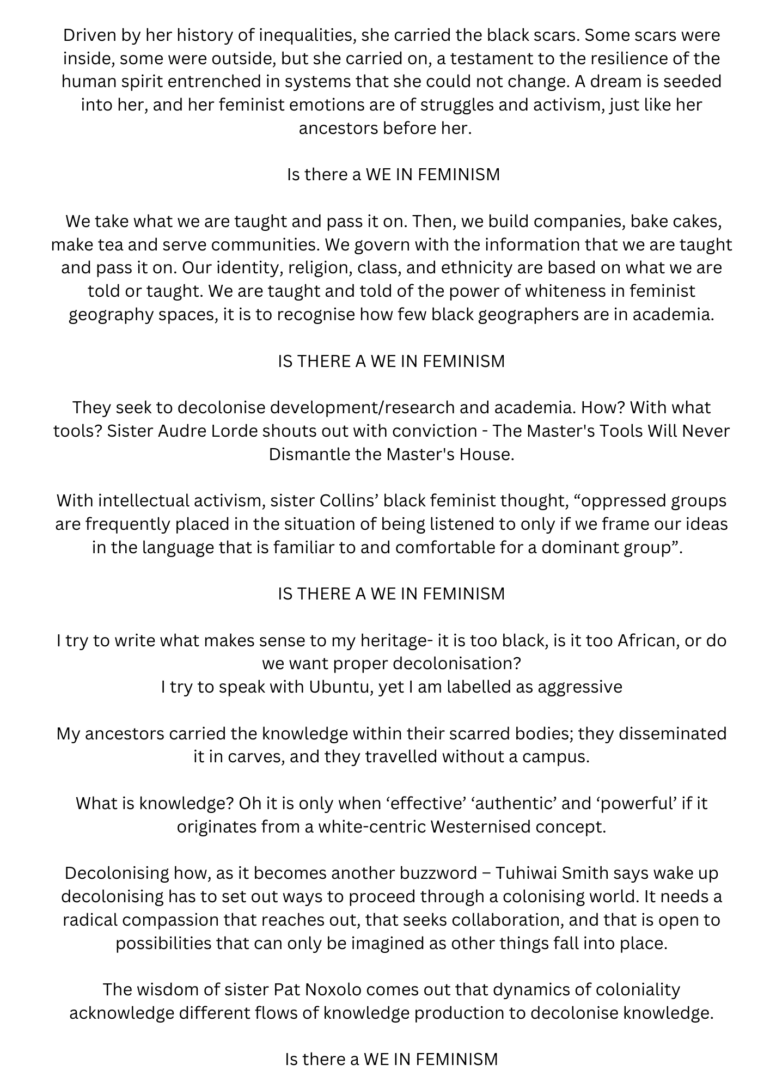
Activism and development
The label of activist was one that was much discussed at DSA2024, including through the keynote of Prof Shirin Rai’s talk on depletion talk on depletion. In the panel on Professionalism and Activism, the co-conveners Fiorenzo Polito, Susannah Pickering-Saqqa and Hamda Mohamed invited students from the SOAS Palestine encampment to the panel, and in the second session, panelists went to the encampment to discuss activism with the students. Emanuela Girei said “It was an enlightening moment of authentic solidarity between academic staff and students.”
Kristen Hope, ESRC-funded postgraduate researcher at the University of Bath said “The most invigorating energy came from my chats with activists in the SOAS Palestine encampment, alongside whom I was honoured to stand in solidarity. This gave me courage to speak out about how the use of terms like ‘decolonisation’ in academic circles rings hollow unless it is accompanied by a willingness to denounce the genocide in Gaza that is being perpetuated by a settler colonial regime.”
Kristen also spoke out at the AGM on her experience and added: “As Stuart Hall reminds us: we must strive to constantly consider the ways in which the political moments we live through influence our understandings of theories and concepts that we use in our research and scholarship. I think that there is a lot of work to be done here, and I’m invigorated by the new connections I’ve made at DSA2024 to take this work forward as part of a global development community committed to decolonial praxis.”
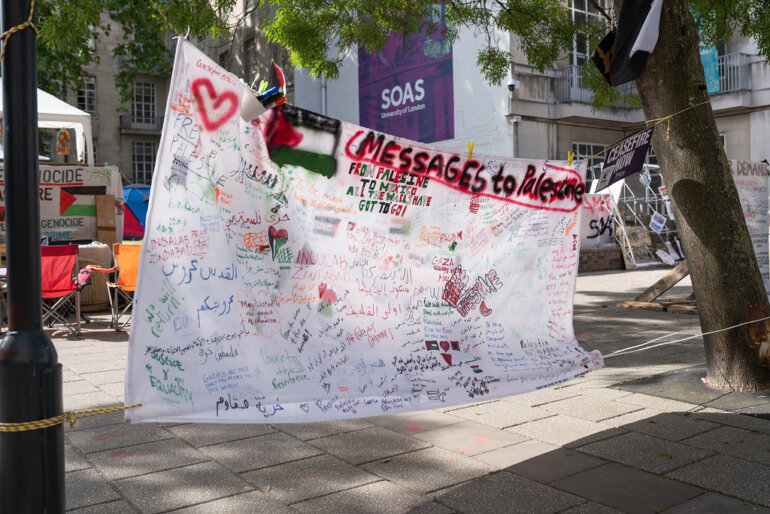
Decolonising development studies
Decolonisation was also a strong theme when talking about social justice. It emerged in the pre-conference event on the future of development studies and continued across the conference, including the launch of the DSA’s new database to list activities taking place on decolonisation, and post-conference news that Southern Voice are collecting stories and strategies to rebalance power in the knowledge ecosystem.
Hamid Khalafallah said: “As usual, DSA2024 brings together great scholars and stimulates critical debates. I am particularly enjoying all the refreshing discussions on the coloniality of knowledge and epistemic injustices, as well as the critiques problematising the discipline and practice of ‘Development’, its inherent colonial roots and the ingenuine dichotomy it creates between the ‘developed’ and the ‘developing’ worlds.” Hamid acknowledged those “speakers who have shown solidarity with Sudan and Palestine in their remarks.”
Hamid is a former Nonresident Fellow at the Tahrir Institute for Middle East Policy focusing on inclusive governance and mobilization in Sudan. He is a development practitioner, researcher, and policy analyst and is currently pursuing a PhD degree at the Global Development Institute . He presented at DAS2024 on the resilience of the Resistance Committees of Sudan, the different roles and strategies that such grassroots movements employ to sustain their mobilisation for democracy, and the long-term impact they instigate beyond normative understandings of democratisation.
Ralph Haddad and Claude Samaa from the NGO Basmeh Zeitooneh for Relief and Development presented on decoloniality with a paper on challenging traditional power dynamics and injustices in research paradigms, advocating for a transformative, participatory model that goes beyond extractive practices.
“Basmeh & Zeitooneh participated in the DSA2024 conference to present our innovative research approach, which prioritizes partnerships between academics and refugee-led organizations,” said Claude Samma. “Our objective was to demonstrate how such collaborations can produce ground-level insights directly from refugees, ensuring that the research is practical and impactful. The conference was invaluable, providing a platform to showcase our collaborative research model, which efficiently utilizes funding for diverse purposes, including academic research, vocational training, and community support. Engaging with a broad spectrum of researchers and practitioners enabled us to advocate for this methodology, highlighting its potential to drive meaningful change. The discussions were enriching, challenging our perspectives, and offering new methods to enhance our work. Networking with NGOs, academics, and policymakers has expanded our outreach and support network.”
“Moving forward, our research findings will be disseminated to highlight the situations of refugees and underprivileged host communities in Lebanon and inform the design and implementation of sustainable solutions for these communities. These solutions will encompass initiatives in education, healthcare, and livelihoods. We plan to deepen our partnerships with international academics and organizations, using our collaborative model to amplify the voices of refugees and drive meaningful change. This approach will enable us to scale our impact and share best practices globally.”
